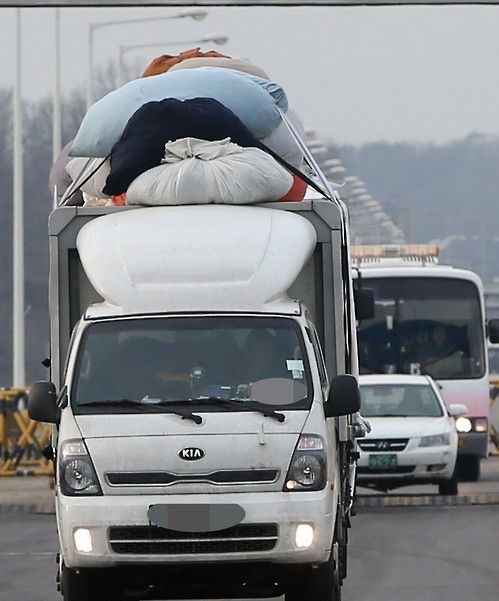- California Assembly OKs highest minimum wage in nation
- S. Korea unveils first graphic cigarette warnings
- US joins with South Korea, Japan in bid to deter North Korea
- LPGA golfer Chun In-gee finally back in action
- S. Korea won’t be top seed in final World Cup qualification round
- US men’s soccer misses 2nd straight Olympics
- US back on track in qualifying with 4-0 win over Guatemala
- High-intensity workout injuries spawn cottage industry
- CDC expands range of Zika mosquitoes into parts of Northeast
- Who knew? ‘The Walking Dead’ is helping families connect
Korean firms report in excess of $660M in losses from factory park shutdown

A truck with extra loads strapped to the top drives through South Korea’s western border city of Paju, north of Seoul, on Feb. 11, 2016, after returning from a joint industrial park in the North Korean border city of Kaesong. (Yonhap)
SEOUL (Yonhap) — South Korean firms based in a jointly run industrial park in a North Korean border city have suffered more than 815 billion won (US$660 million) in losses from its shutdown, their association claimed Wednesday.
Earlier this month, North Korea expelled South Korean workers from the Kaesong Industrial Complex and froze the assets of companies operating there, a day after the South suspended operations in retaliation for Pyongyang’s rocket launch.
The shutdown of the industrial park, regarded as the top achievement of inter-Korean reconciliation and cooperation efforts, is feared to deal a heavy blow to the South Korean firms involved.
A total of 124 South Korean companies have been operating in the zone, some 50 kilometers northwest of Seoul, employing more than 54,000 North Korean workers to produce labor-intensive goods, such as clothes and utensils.
The estimated financial damage breaks down to some 569 billion won in investment and facilities, and some 245 billion won in inventory.
The association said any potential losses stemming from compensation to their customers and the stoppage of their operations was not included in the tally.
According to the association, 49 companies largely rely on their factories in the industrial park for their production. “Actual damage should be counted more accurately, and will be revealed later,” it said.
South Korean companies at the inter-Korean industrial park have been urging their government to roll out full support measures as their losses from the park’s shutdown are unimaginable.
When the industrial park was closed in 2013 for 160 days, South Korean firms reported a combined loss of 1.05 trillion won.
The companies, however, claim the actual damage will be greater considering the loss of business partners and credibility.
“We strongly demand that the government fully compensate our losses in investment and other assets as insurance coverage is very limited,” it said.
But the Unification Ministry said that the association’s loss estimate is seen as overblown as its calculations are not backed by factual data.
“The result was compiled based on the companies’ own estimates of losses without any objective data or asset assessment,” the ministry said in a statement.
In order to minimize South Korean firms’ possible losses, the country’s financial regulator earlier said it would provide financial aid to the firms operating there.
The complex, which opened in 2004, had served as a major revenue source for the cash-strapped North, while South Korea had benefited from cheap but skilled North Korean labor.
The complex had been recognized as an exception to Seoul’s sanctions against Pyongyang designed to punish it for the sinking of a South Korean warship in 2010.
















